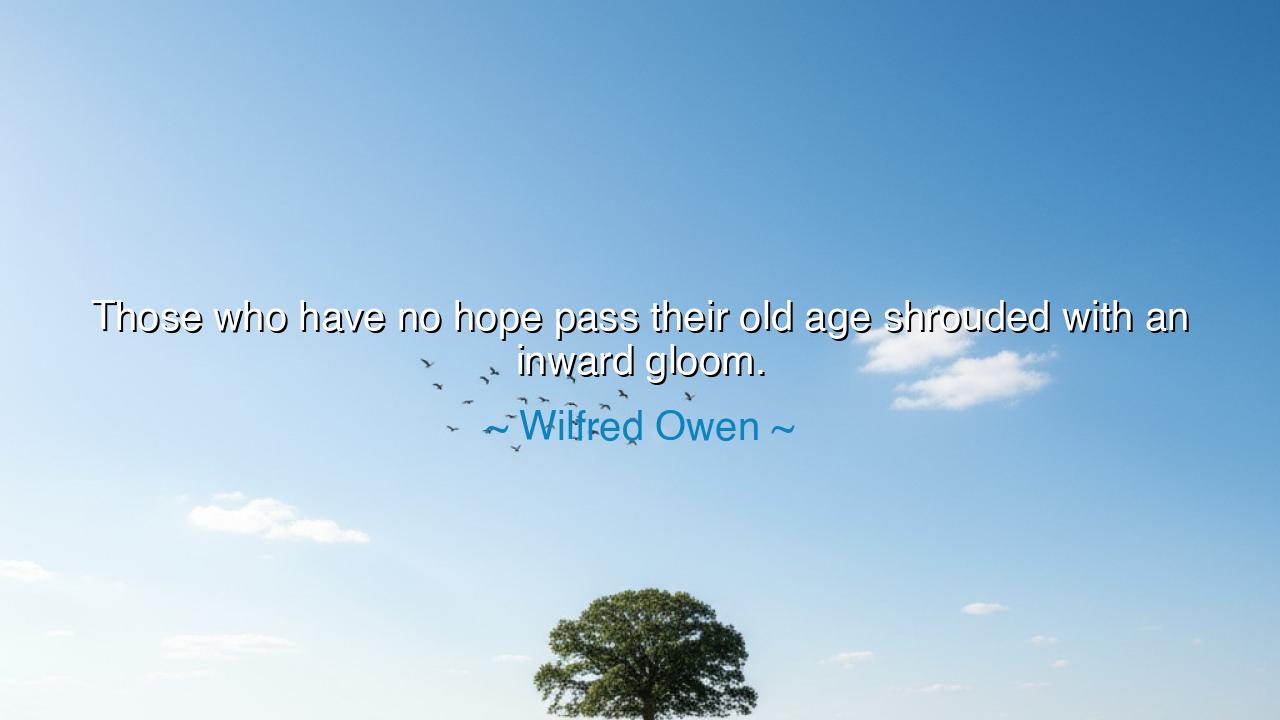
Those who have no hope pass their old age shrouded with an inward






“Those who have no hope pass their old age shrouded with an inward gloom.” — Wilfred Owen
So spoke Wilfred Owen, poet of sorrow and soldier of the Great War, whose pen was dipped in both blood and compassion. From the trenches where the earth itself groaned beneath the weight of despair, Owen looked upon humanity and saw not merely death, but the slow dying of the spirit. In these words, he warns us: without hope, the heart grows dim long before the body fades. For hope is the last light of the soul—it is the small, defiant flame that endures even when reason falters, even when the heavens themselves seem silent.
In this quote, the poet unveils a truth older than the pyramids and as enduring as the sea: that a life without hope is a life that decays inwardly. The body may still walk, the eyes may still see, yet the spirit withers in shadow. Inward gloom—that silent, invisible grief—takes root when one ceases to believe that tomorrow can bring renewal. To live without hope is to be exiled from one’s own future. It is a slow death, not of the flesh, but of the dream. Owen, who saw young men die with courage and old men live in bitterness, understood that despair is the cruelest of prisons.
Recall the tale of Job, that ancient sufferer who lost all that the earth could take—his home, his family, his health. Though crushed by misfortune, he clung to a single thread: the belief that his suffering was not meaningless. That thread was hope, and through it, he endured. But imagine if Job had not hoped. His story would have ended not in restoration, but in madness. This is the lesson Owen whispers from across time: that hope is not mere comfort—it is the essence of endurance. Without it, even peace feels hollow, and even age, which should bring wisdom, becomes but a long twilight of regret.
Owen’s words carry the weight of one who saw men broken before their time. In the mud of the Somme, he watched the young lose not only their lives but the promise of what might have been. Yet it was the survivors—those who lived but no longer believed—that haunted him most. Their old age, though untouched by bullets, was darkened by the memory of loss and the absence of purpose. Their bodies returned home, but their souls never did. To live long without hope is to outlast one’s own joy; it is to walk the earth as a ghost of what once was.
The ancients knew this too. Sophocles, in his tragedies, showed how a man’s ruin begins not in external misfortune, but in the moment he abandons hope. When Oedipus blinds himself, it is not his sight he loses first, but the belief that light can still return. So too in our time: the world grows old not when the years advance, but when the heart surrenders to despair. The face wrinkles with age, but it is the loss of hope that truly withers the soul.
Yet Owen does not speak these words to condemn, but to awaken. He reminds us that hope is not born of circumstance—it is chosen. It is the act of saying, “Though all seems lost, I will believe that meaning remains.” Hope is the courage to plant a seed even in winter, knowing that spring will come though we may not live to see it. It is the quiet strength that carries us across decades, turning hardship into wisdom and endurance into grace.
Practical counsel for those who would live wisely:
-
Guard your hope as you would guard your breath; feed it with purpose and protect it from bitterness.
-
When life seems barren, seek out the smallest signs of renewal—a kind word, a morning sun, a task well done—and let them remind you that light still returns.
-
Keep company with those who believe in tomorrow; for despair, like disease, spreads through the soul that listens too long to the hopeless.
-
And when you grow old, let not your years weigh upon you like chains, but let your memories shine as lanterns to the young.
For those who live in hope, age becomes not a decline, but a harvest—a gathering of meaning. But for those who cast hope aside, the years turn to ashes in the hand. So let us heed Owen’s wisdom, and carry in our hearts this eternal flame: as long as there is hope, there is youth eternal within the soul.






AAdministratorAdministrator
Welcome, honored guests. Please leave a comment, we will respond soon